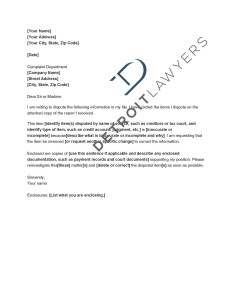via the NYTIMES:
TransUnion, Equifax and Experian Agree to Overhaul Credit Reporting Practices
Over the past few blogs we have talked about ways to clear up your credit history and superficially discussed some of the different things increase your credit score. In order for your credit score to be accurate, it’s important that there are no errors on your credit report. With the meteoric rise in identity theft and fraud it is very important to ensure the accuracy of your credit report. You are entitled to one free credit report (not score) from each of the three credit reporting agencies (Experian, Equifax and TransUnion) once a year. We recommend that our clients pull a credit report from one of these agencies every four months to ensure information is being properly reported.
It’s also important to remember that not all creditors report to the credit reporting agencies. Many times credit unions, local retailers, and gasoline credit cards do not report to the agencies.
Just recently, the three major credit reporting agencies (Experian, Equifax and TransUnion) reported that disputing a mistake on your credit report could get easier. Today, we will look at what the agencies said and what steps are necessary in order to correct erroneous information on your credit report.
What changes were made?
The announcement on March 9, 2015 indicated that people who contest items in their credit reports will receive more information concerning those disputes, including instructions on what they can do if they don’t like the response.
The credit reporting agencies also said that the effects of medical debt will become less severe. Now, medical debts won’t be reported until after a six month waiting period to allow time for insurance payments to be applied. Prior to this change the agencies would often report medical debts that insurance was responsible for paying but had yet to pay due to delays in the processing. The agencies also said they would remove previously reported medical collections that have been paid or are being paid by insurance companies.
In addition, the three credit reporting agencies will stop reporting debts that are the result of tickets or fines.
You can expect to see these changes over the next several months.
What should I do if I see errors on my credit report?
First, throughout this process it’s very important to keep detailed and accurate records.
Under the Fair Credit Reporting Act (FCRA), you are allowed to dispute inaccurate information on your credit report. To dispute any inaccuracies you need to write a letter to the credit reporting company and the creditor stating what information is inaccurate, what the report should state, the facts that support your position and a request that the information be removed or corrected. It helps to include copies of statements or bills in support of your dispute. Send the letter along with any supporting documentation by certified mail with return receipt requested. This ensures you can document what the credit reporting company and creditor received.
The bureau will then forward a copy of your dispute to the creditor who provided the information. The creditor needs to review the dispute and provide the bureau with a response. If the information is found to be inaccurate then the creditor must notify the three major credit bureaus.
You will usually receive the results of your dispute within 30 days. If the dispute results in a change then the bureau will give you another copy of your report with the corrections on it. And, if you ask, the credit bureau must send notices of any corrections to anyone who received your report in the past six months.
In The End
In the end, it’s important to make sure that your credit report is accurate. Because, as we have discussed in previously blogs, your credit report, and in turn your credit score, has an impact on a number of different things.
Give our office a call if you would like help disputing inaccuracies on your credit report.

